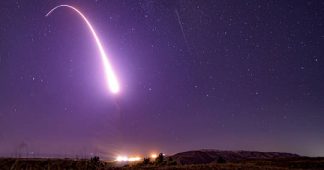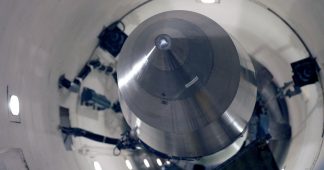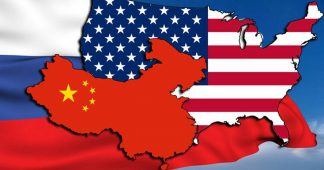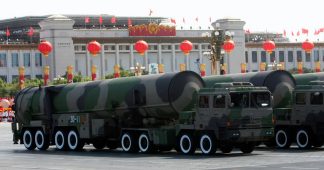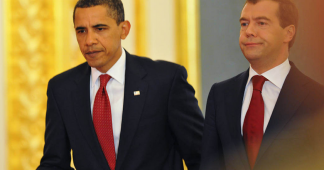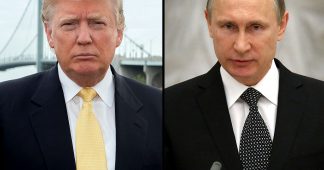U.S. diplomats are trying to play hardball with Russia in negotiations over whether to extend New START
The Trump administration has asked the military to assess how quickly it could pull nuclear weapons out of storage and load them onto bombers and submarines if an arms control treaty with Russia is allowed to expire in February, according to three people familiar with the discussions.
The request to U.S. Strategic Command in Nebraska is part of a strategy to pressure Moscow into renegotiating the New Strategic Arms Reduction Treaty before the U.S. presidential election, the people said.
In making the request, the Trump administration wants to underscore that it is serious about letting the treaty lapse if Russia fails to meet U.S. demands. The negotiating team is leery that Russia is dragging out the talks in the hope that Joe Biden — who has pledged to extend New START under what Moscow believes will be more favorable terms than what this White House is offering — wins the election.
“It’s a clear signal that the costs for not negotiating before the election are going to go up,” said one of the people, who requested anonymity to relay sensitive discussions. The Trump administration is “trying to create an incentive, and it’s a real incentive, for the Russians to sit down and actually negotiate.”
The request for the assessment came in the last two weeks from a group of officials at the National Security Council and State, Defense and Energy departments that’s supporting Ambassador Marshall Billingslea in negotiations with Moscow to try to replace New START before it runs out in February.
The assessment will determine how long it would take to load nuclear weapons now in reserve onto long-range bombers, ballistic missile submarines and land-based silos to beef up the U.S. nuclear force in the event Russia increases its arsenal.
It comes as Billingslea has publicly raised the possibility of putting more weapons on bombers and submarines if New START lapses and has sharpened his rhetoric in recent days to try to secure more concessions from the Russians.
“It would certainly be a question that you would want to ask STRATCOM,” said retired Air Force Lt. Gen. Frank Klotz, who oversaw nuclear forces before serving as head of the DOE’s National Nuclear Security Administration. “You would want to fully understand all the possible implications of your negotiating approach, both if it should succeed or, alternatively, if it should fail.”
But former senior arms control and military officials also consider the move a risky gambit. It could send a message that the Trump administration, which has already pulled out of two other nuclear-related treaties with Russia, is no longer interested in any limits on the world’s largest arsenals. And it could goad the Russians into taking similar steps.
“I call that megaphone diplomacy,” said Rose Gottemoeller, who served as deputy secretary general of NATO until last year and negotiated New START when she was at the State Department. “Do we want to end up in a less stable place? Because we would be nuclear arms racing.”
“It’s very stupid,” added a former GOP arms control official who declined to be identified because he still advises the government. “It makes absolutely no sense to threaten to upload. It becomes a valid leveraging point only if the other side can’t do it. The Russians can do it, too.”
“But more importantly,” this person added, “the systems we have deployed today are the ones we believe are necessary to provide an adequate deterrent. There is no obvious reason and every reason not to in the absence of a change in the threat. It’s not going to scare the Russians. The likelihood of success with the Russians is about nil.”
A State Department spokesperson declined to comment on Billingslea’s behalf.
Capt. Bill Clinton, a spokesperson for Strategic Command, declined to address the military’s role in the deliberations. “We don’t talk about future operations, and really can’t speculate on arms control talks (as that is not [our] responsibility),” he wrote in an email.
An NSC spokesperson declined to comment.
New START, signed in 2010, mandated both sides draw down to 1,550 deployed strategic weapons and includes provisions to verify compliance, including reciprocal on-site inspections of nuclear bases.
The pact is set to expire on Feb. 5 unless both sides agree to an extension for up to five years.
Russia in December offered to extend the treaty without preconditions. The position of the Trump administration, which withdrew from both the Intermediate-Range Nuclear Forces and the Open Skies treaties, has been that New START is too narrow and a replacement is needed that covers more classes of weapons, such as “tactical” or battlefield nuclear weapons.
At the outset of negotiations in June, the U.S. also insisted that China be party to any new agreement, but dropped that demand after Beijing balked.
The U.S. negotiating team has insisted on a number of Russian concessions: a commitment to follow-on talks about a new arms deal that includes all U.S. and Russian nuclear weapons; a pledge to eventually bring in China, which is projected to double its relatively small nuclear arsenal in the next decade; and strong compliance measures.
Read more at www.politico.com
